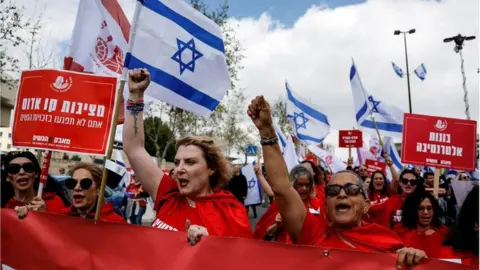Israel judicial reform explained: What is the crisis about?
 Reuters
ReutersThe crisis in Israel reaches a significant moment on Tuesday, with an attempt at the Supreme Court to overturn a controversial law passed by the government. It follows months of turmoil over the government's plans to change the way the judicial system works. Here is a brief guide to what is going on.
What is happening in Israel?
Since the start of the year, huge weekly protests have been held by people opposed to the government's reform plans. The scale of the protests has escalated, with tens of thousands of people packing the streets in towns and cities across the country.
Undeterred, the government (which has a comfortable majority in parliament) passed into law in July the first planned change - a so-called "reasonableness" bill. This removed the power of the Supreme Court (and lower courts) to cancel government decisions deemed "extremely unreasonable".
Protesters have called for all the planned reforms to be scrapped and for the Prime Minister, Benjamin Netanyahu, to resign. They are supported by Mr Netanyahu's political rivals, as well as former top officials in Israel's military, intelligence and security services, former chief justices, and prominent legal figures and business leaders amongst others.
In a move which has caused deep concern on both sides, hundreds of military reservists, including air force pilots crucial to Israel's defence, have threatened to refuse to report for service. This has led to warnings that it could impair Israel's military capabilities.
What are people so angry about?
Mr Netanyahu's opponents say the reforms will severely undermine the country's democracy by weakening the judicial system, the only tool for keeping the government's use of its powers in check.
Underlying this is strong opposition to the kind of government currently in office - the most right-wing in Israel's history - and to Mr Netanyahu himself.
Critics say the reforms will shield Mr Netanyahu, who is currently on trial for alleged corruption (he denies the charges), and help the government pass laws without any brakes.
The government argues that the judiciary interferes too much with legislation, is biased in support of liberal issues, and is undemocratic in the way judges are selected.
What are the legal reforms at the centre of the crisis?
They concern the power of the government versus the power of the courts to scrutinise and even overrule the government. The government - and others - say reform is overdue, though the plans go much further than many people would like.
Besides the "reasonableness" law, the government wants to:
- Weaken the power of the Supreme Court to review or throw out laws, enabling a simple majority of one in the Knesset (parliament) to overrule such decisions, although Mr Netanyahu has said he will not proceed with this particular reform
- Have a decisive say over who becomes a judge, including in the Supreme Court, by increasing its representation on the committee which appoints them
- Scrap the requirement for ministers to obey the advice of their legal advisers - guided by the attorney general - which they currently have to do by law
What happens next?
In an unprecedented gathering of all its 15 judges, the Supreme Court will begin hearing on Tuesday challenges to the reasonableness law. This is regarded as one of the most important cases in the court's history.
If the court overturns the new law, it will mark a significant victory for the protesters and a major setback for the government.
The court is also due to review this month another law making it more difficult for a prime minister to be removed from office, which the government passed in March. The cases will test both the government and the Supreme Court and raise the political tempo even further.
Meanwhile, with fury on the streets and a battle of wills playing out, there is no end in sight to the crisis.
